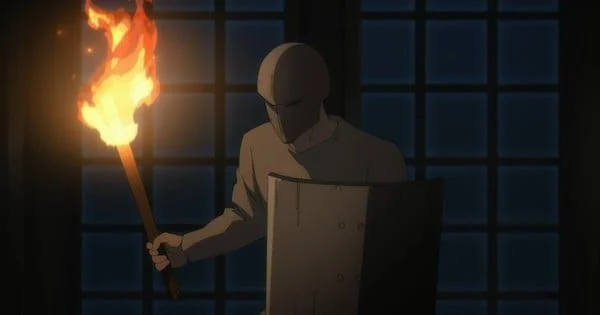A Time Jump and a New Era of Conflict
Episode 16 of “Orb: On the Movements of the Earth” marks a significant shift in the narrative, catapulting viewers 25 years into the future. The aftermath of the events surrounding Badeni, Oczy, and Jolenta has reshaped the world, creating a new landscape of conflict and resistance. The episode, titled “The Action Begins,” wastes no time in establishing this new status quo, highlighting the deep societal changes that have occurred. This time jump is not merely a plot device; it signifies a thematic evolution, moving the focus from the initial scholarly pursuit of heliocentrism to the practical implications of that knowledge in a world rife with religious oppression.
The Rise of the Heretic Liberation Front
The most notable development in this new era is the emergence of the Heretic Liberation Front, a radical group challenging the Church’s authority. The Church’s ethical corruption has reached its zenith, leading to widespread resistance. This rebellion is not just a political movement but a reflection of the growing discontent with the Church’s oppressive control over knowledge and thought. The leader of this front is a charismatic figure named Schmidt, who employs tactics that would be considered extreme by the standards of the prior acts. He isn’t just a mere revolutionary; he represents a new kind of resistance, blending theological arguments with direct, and often explosive, action.
A Heist Movie Vibe with Philosophical Undertones
The episode opens with a visually striking sequence that feels more like a Michael Mann heist film than a period drama. This stylistic choice is a departure from the previous episodes, adding a layer of tension and suspense to the narrative. The scene involving the prisoner carriage approaching the church is masterfully crafted, with Kensuke Ushio’s soundtrack building a palpable sense of unease. The narrative cleverly juxtaposes the heist’s high stakes with profound discussions about theology and natural philosophy, creating a unique blend of action and intellectual discourse. This sequence exemplifies how “Orb” continues to evolve and adapt, ensuring that it never sits still thematically or stylistically.
Schmidt: A Heretical Folk Hero
Schmidt is not just a leader of a resistance group; he embodies the spirit of rebellion against the dogmatism of the time. His ideology is a complex mix of pro-God sentiments and anti-Church views, which makes him a compelling character in this new phase of the story. The corruption within the Church, which viewers have witnessed in previous episodes, makes Schmidt’s position seem not only reasonable but also morally justified. His character design, complete with a dapper mustache, adds to his appeal and makes him an intriguing figure to follow.
The Heliocentric Theory as a Weapon
Central to the narrative in this episode is the quest for a book containing cryptic writings that hint at the heliocentric theory. This book isn’t just a collection of scientific theories; it becomes a symbol of rebellion and a weapon against the established order. The Church’s desperate attempt to suppress this information only serves to reinforce the theory’s transformative potential. The book and the heliocentric idea are presented not just as scientific concepts but as powerful forces capable of shaking the foundations of society, adding layers of complexity to the series’ core themes.
Echoes of Christianity’s Schisms
The rise of the Heretic Liberation Front mirrors historical instances of schisms within Christianity. While the show does not use real historical names, it is clear that this rebellion echoes the many times the church has faced such challenges during the medieval period. The show highlights how oppression often leads to resistance, and Schmidt’s character, in this way, can be seen as a fictional version of figures who challenged the Church’s authority in history. However, the show makes it clear that unlike figures like Martin Luther, Schmidt is not above using violence to pursue his goals.
New Characters and Shifting Focus
“Orb” is moving even further from the ecclesiastical world that defined its first act. In addition to Schmidt, the audience is introduced to new characters, including a girl from a nomadic tribe. These new protagonists represent a significant departure from the intellectual focus of the beginning of the show, indicating that the series will now tackle these themes from a wider variety of perspectives. This deliberate shift in focus suggests that the series is exploring the broader impact of heliocentrism on society, rather than just focusing on the intellectual debate. The inclusion of a character from a nomadic tribe could hint at the series exploring themes of cultural differences and diverse ways of knowing.
A Continuing Exploration of Conflict and Change
The episode makes it clear that the themes of conflict, oppression, and the search for truth will continue to be central to the series. The world created by “Orb” is one where knowledge is not just an intellectual pursuit but also a force for change. This episode serves as a powerful reminder that the struggle for truth and freedom is an ongoing process, filled with complications and sacrifices. The series is setting the stage for new conflicts and challenges that will require the characters to grapple with the consequences of their beliefs and actions.
Looking Ahead: The Future of the Narrative
The episode leaves many questions unanswered, sparking curiosity about the direction the narrative will take. The motivations of Schmidt are still open to interpretation. Is his interest in heliocentrism purely strategic or is he truly interested in understanding the universe? How will the new character from the nomadic tribe fit into the larger narrative? These questions will surely keep viewers invested and engaged in the series. The end of the episode also hints that the series will likely explore new ways of showing conflict, now moving from the individual struggle of Rafal to a more societal conflict between the church and the heretics, as well as conflicts with the nomads.
Conclusion
Episode 16 of “Orb: On the Movements of the Earth” is not just a continuation of the story but a transformation of the narrative itself. The 25-year time skip has created a new world filled with conflict, resistance, and compelling characters. The blend of action, philosophical discussion, and historical undertones makes for a rich and engaging viewing experience. The introduction of the Heretic Liberation Front and characters like Schmidt promises a thrilling new direction for the series, making it a must-watch for fans of historical dramas and thought-provoking narratives. The series continues to show an impressive ability to adapt to its own story, ensuring that it remains engaging, entertaining, and surprising for its viewers.










